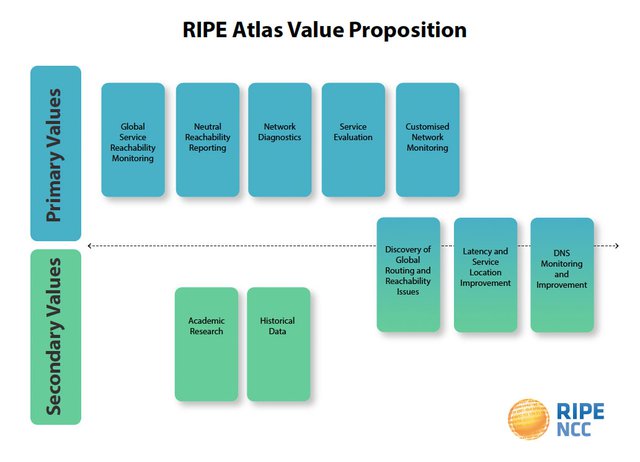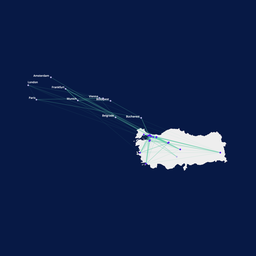During its meeting in September, the RIPE NCC presented the RIPE NCC Executive Board with a value proposition document detailing the value that RIPE Atlas can bring to network operators, researchers and the Internet community as a whole. The board asked the RIPE NCC to publish this document, which we have done here. We also plan to incorporate much of its content into the RIPE Atlas website so that RIPE Atlas users can clearly understand the different ways this global Internet measurement network can be used and the many unique benefits it provides.
RIPE Atlas is a global Internet measurement network that offers unique and unprecedented value to a wide user base, including both RIPE NCC members and the larger Internet community. Specifically, RIPE Atlas provides data, network monitoring and diagnostic tools for users ranging from Internet Service Providers to network operators to academic researchers, and helps create a more efficient and resilient Internet for everyone. Because it is a RIPE NCC service, RIPE Atlas is unique among Internet measurement initiatives in that it is a trusted source of neutral, reliable data. Here, we expand on some of the most valuable uses for this service and the ways in which it can benefit the RIPE NCC’s membership and other key stakeholders.
Delivered Values:
There are three main value categories. The first is primary values, which are major benefits that users can enjoy immediately and directly by interacting with RIPE Atlas.
The second category is secondary values, which are benefits that the Internet community experiences on a more indirect level, simply from having a network like RIPE Atlas running on the Internet and being used by others.
The third category is shared values, which contain elements of the first two.
1. Primary Values:
a. Global Service Reachability Monitoring: With thousands of vantage points, users can monitor the reachability of their services from around the globe. While smaller networks can take advantage of this expanded scope, even widely distributed networks benefit from the unique external perspective RIPE Atlas provides in verifying their own data. The addition of RIPE Atlas anchors means the network can handle increased measurement capacity as well as guarantee stable, distributed, cooperating measurement targets. The RIPE NCC also uses RIPE Atlas to provide a reachability analysis of RIPE NCC members’ networks as part of their Assisted Registry Check (ARC) review, in which the RIPE NCC provides members with personalised support to help them better manage their resources.
b. Neutral Reachability Reporting: As a neutral third party, the RIPE NCC is trusted to provide reliable and unbiased reports on network health and reachability. These reports can be used by organisations to make unbiased decisions on partnership agreements, or to provide customers with trustworthy information about the quality of service they provide.
c. Network Diagnostics: There are multiple scenarios in which solving access issues, even within a user’s network, is very complex without having access to global vantage points. RIPE Atlas provides the global perspective required to perform complicated network diagnostics, and offers the advantage of providing “ordinary” vantage points, as thousands of probes are installed in average home networks.
d. Service Evaluation: With RIPE Atlas, organisations are able to see how their services are distributed and accessed from different geographical regions, which can help in expansion planning. One recent example of this includes ISOC using RIPE Atlas to determine the best locations for IXPs in Africa. The availability of historical data means it is also possible to measure the effectiveness of new installations and their success in reducing latency and path length while increasing resiliency.
e. Customised Network Monitoring: RIPE Atlas “status checks” allow network operators to harness the power of RIPE Atlas’ globally distributed network for use in their existing monitoring tools, while defining their own customised variables and thresholds for reporting issues.
2. Secondary Values:
a. Academic Research: More and more, researchers are using RIPE Atlas to discover operational issues and, as a result, help inform the development of new Internet standards by such bodies as the IETF and W3C. A few examples include using RIPE Atlas for Path MTU Discovery and investigating instances of censorship on the Internet. This kind of research helps create a more efficient, resilient Internet for users around the globe.
b. Historical Data: The historical data provided by RIPE Atlas allows for the high-level planning of critical Internet infrastructure, such as selecting the locations for DNS root servers or Internet Exchange Points, in order to improve user experience and shorten the average global path between Internet users.
3. Shared Values:
a. Discovery of Global Routing and Reachability Issues: Both individual RIPE Atlas users and content providers use RIPE Atlas to detect global routing issues much faster and more easily, helping to resolve the common complaint from end users: “My Internet works but I cannot reach site X”.
b. Latency and Service Location Improvement: Several global content providers have used RIPE Atlas to determine reachability and latency to their data from a global point of view, and have made changes to their network infrastructure as a result in order to improve access times or determine key expansion points for peering and interconnection. A recent example involves the Wikimedia Foundation investigating the best locations for servers in order to optimise access to Wikipedia for their global user base.
c. DNS Monitoring and Improvement: RIPE Atlas provides DNS measurements and extensive DNS access history, which can be used to improve the overall DNS experience for users on different levels, from root name server and ccTLD access down to the placement of local resolvers.






Comments 0
The comments section is closed for articles published more than a year ago. If you'd like to inform us of any issues, please contact us.